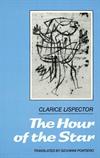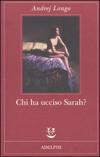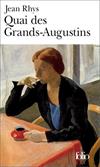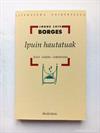
The Hour of the Star
by Clarice Lispector | Literature & Fiction | This book has not been rated.
ISBN: 9780811211901 Global Overview for this book
ISBN: 9780811211901 Global Overview for this book
2 journalers for this copy...
 The Hour of the Star, or "The Blame is Mine," or "She Doesn't Know How to Protest," (or one of eleven more choices of subtitles) is a compact, compelling, and disturbing book. The narrator, Rodrigo S.M., writes the story of Macabea, a young female clerk, almost against his will: "Before this typist entered my life, I was a reasonably content chap despite my limited success as a writer. Things were somehow so good that they were in danger of becoming very bad because what is fully mature is very close to rotting." Stream-of-consciousness writing filled with Rodrigo's personal anguish intermingles with the telling of Macabea's story. "Born with a legacy of misfortune, a creature from nowhere with the expression of someone who apologizes for occupying too much space," Macabea is an ugly, undernourished native of rural Northeast Brazil who loves Coca Cola and Marilyn Monroe, lives on a steady diet of hot dogs, and believes that "to be well educated was the same as knowing how to tell lies." Her daily life is constricted by the bleakest poverty, her spirit is squeezed into voiceless want, her intelligence is choked with unknown need. In less than one hundred pages, Clarice Lispector tells a brilliantly multi-faceted and searing story. — From 500 Great Books by Women; review by Jesse Larsen.
The Hour of the Star, or "The Blame is Mine," or "She Doesn't Know How to Protest," (or one of eleven more choices of subtitles) is a compact, compelling, and disturbing book. The narrator, Rodrigo S.M., writes the story of Macabea, a young female clerk, almost against his will: "Before this typist entered my life, I was a reasonably content chap despite my limited success as a writer. Things were somehow so good that they were in danger of becoming very bad because what is fully mature is very close to rotting." Stream-of-consciousness writing filled with Rodrigo's personal anguish intermingles with the telling of Macabea's story. "Born with a legacy of misfortune, a creature from nowhere with the expression of someone who apologizes for occupying too much space," Macabea is an ugly, undernourished native of rural Northeast Brazil who loves Coca Cola and Marilyn Monroe, lives on a steady diet of hot dogs, and believes that "to be well educated was the same as knowing how to tell lies." Her daily life is constricted by the bleakest poverty, her spirit is squeezed into voiceless want, her intelligence is choked with unknown need. In less than one hundred pages, Clarice Lispector tells a brilliantly multi-faceted and searing story. — From 500 Great Books by Women; review by Jesse Larsen.
 This was the first time I read The Hour of the Star, and my remarks are going to be colored by the fact that I rarely read books as tangled and prickly, with as many levels of writing, as this. I will mostly talk about my puzzlement as I read. The "author", ostensibly a male writer named Rodrigo S.M., is incessantly talking both about what drives him to write this story, his methods and difficulties, and his reactions to what he's writing. The afterword (by the translator) suggests that Clarice Lispector chose this persona to keep a distance between herself and the novel, yet the translator doesn't find the separation convincing, and neither do I. If Rodrigo says he chose to write about Macabéa, that totally insignificant and seemingly unattractive person, because he became obsessed by her after glimpsing her in the street, and he claims that he immediately, without thinking, knew all the facts of her life; Lispector equally must be struck by the great contrast between her own life as a glamorous icon and that of her character, and must struggle with empathy, unwilled or unwilling -- I do not think that the divide of gender is necessarily harder to cross than that of social circumstances, either one is very difficult.
This was the first time I read The Hour of the Star, and my remarks are going to be colored by the fact that I rarely read books as tangled and prickly, with as many levels of writing, as this. I will mostly talk about my puzzlement as I read. The "author", ostensibly a male writer named Rodrigo S.M., is incessantly talking both about what drives him to write this story, his methods and difficulties, and his reactions to what he's writing. The afterword (by the translator) suggests that Clarice Lispector chose this persona to keep a distance between herself and the novel, yet the translator doesn't find the separation convincing, and neither do I. If Rodrigo says he chose to write about Macabéa, that totally insignificant and seemingly unattractive person, because he became obsessed by her after glimpsing her in the street, and he claims that he immediately, without thinking, knew all the facts of her life; Lispector equally must be struck by the great contrast between her own life as a glamorous icon and that of her character, and must struggle with empathy, unwilled or unwilling -- I do not think that the divide of gender is necessarily harder to cross than that of social circumstances, either one is very difficult.The difficult language of this book may be necessary, because it is an attempt to reckon with the inner life of Macabéa, who is quite inarticulate, who barely uses words to organize her world. No one's emotions and impulses are truly straightforward, and Macabéa's perhaps less than average. No wonder the author's attempts to talk about it can verge on the paradoxical. The author also intends to confound expectations, stereotypes, and sentimentality. The insistence on being stark and unadorned applies to descriptions of external circumstances, certainly, of which there hardly are any; yet Macabéa's inner world is summoned up in detail, but the author seems to think that any abstract term may not be understood, and must qualify and explain around it. These rules for writing are broken only in the pages after Macabéa has been hit by a car and lies dying; the author seems to be saying that this is the greatest hour of her life, and only then adorns the exterior with some blades of grass and a candle, and allows herself to speak of experiences in terms very nearly glorious.
Well, I barely understood what I read, but it was well worth the thought invested, and made me want to read it again sometime.
Thanks so much for your donation Vasha!
This book is now part of the 1001-library. If you want to take this book from the library but don't know how to proceed, please refer to the 1001-library bookshelf.
This book is now part of the 1001-library. If you want to take this book from the library but don't know how to proceed, please refer to the 1001-library bookshelf.







